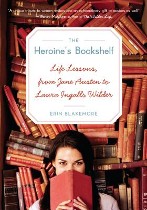 Erin Blakemore •
Erin Blakemore •
The Heroine’s Bookshelf •
I wish I had written this book, mainly because its premise makes so much sense to me: looking to fictional heroines for guidance in navigating life’s challenges. You may be doing something of the sort already, even if it’s not as overt as asking yourself How would Francie Nolan (A Tree Grows in Brooklyn) cope with the demands of an exasperating family? What would Jane Eyre do if she lost her boyfriend/job/apartment? (As you may recall, Jane does lose the 19th-century equivalent of all those things in the book bearing her name.)
Each of twelve chapters connects one cardinal trait to the leading lady who best demonstrates it in works of fiction. Scout Finch of To Kill a Mockingbird embodies compassion; Colette’s Claudine is the epitome of indulgence. Blakemore also draws parallels between stories: Laura Ingalls Wilder is considered the “literary sister” of Ántonia Shimerda.
It’s intriguing to learn what the authors who created these role models endured in their own lives. Lucy Maud Montgomery was subject to acute depression, which may well explain why Anne of Green Gables is so relentlessly cheerful. Zora Neale Hurston underwent her own crisis of faith, resulting in Their Eyes Were Watching God.
Thinking of yourself as a character whose story will one day be recounted on the page isn’t so much self-aggrandizement as a reminder to behave with grace and integrity. Fashions and external circumstances change over the centuries, but the human situation doesn’t, and a little shot of Scarlett O’Hara may be just what you need to see you through a professional setback or a personal struggle.







Your email address will not be published.